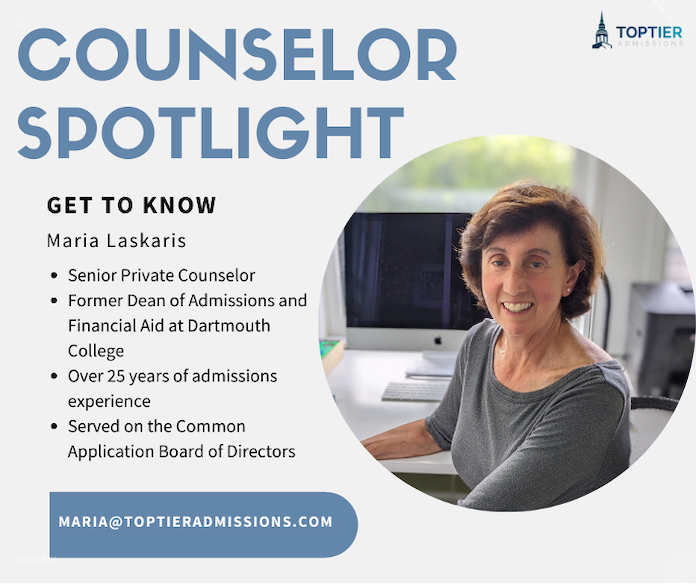Our mission at Top Tier Admissions is to provide comprehensive support, guidance, and resources to students and families navigating the college admissions process. We prioritize teen mental health and work towards alleviating the stress and pressures associated with this process, empowering students to make informed decisions, nurturing their authentic love of learning, and encouraging academic achievement.
How has your experience as the former Dean of Admissions at Dartmouth College informed your approach to Private Counseling?
My many years at Dartmouth — both as an admissions officer and the Dean of Admissions and Financial Aid — has given me a deep reservoir of knowledge on all facets of the selective college admissions process and, most notably, the highly complex and nuanced process that applications are read and candidates are selected. I bring that knowledge to my approach to private counseling and share those insights with my students and their families, as well as my colleagues here at Top Tier. In counseling students, I’m always thinking ahead to how an admissions officer will read their file. Wanting my students to realize their admissions aspirations, I encourage them to focus on becoming scholars and high-impact members of their communities.
With over 25 years of admissions experience, what have you noticed as the biggest shifts in the higher ed and selective admissions landscape?
There are almost too many to mention, and the last several years have brought fairly seismic shifts! In all seriousness, I’d say the following have been the major shifts in higher ed and the selective college admissions landscape:
Diversity and increased access. Today’s top colleges continue to see a diverse community as important to their educational missions. A major theme over the last 25 years has been about increasing access to groups of students who have historically been underrepresented at top colleges — students of color, those who are first in their families to go to college, students from low-income backgrounds, veterans, among others.
Despite the Supreme Court’s decision last June to overturn the use of affirmative action in college admissions, the priority around assembling a diverse class has not lessened. Some of the tools in the admissions toolkit may have been taken away, but as we’ve seen in the supplemental essay questions this cycle, colleges are providing students with plenty of opportunities to share their unique experiences and perspectives.
Extreme competitiveness among top universities, driving up application volume and driving down admit rates. Whether it’s because of rankings or other measures of institutional bragging rights, you can’t escape the fact that colleges are aggressively building their applicant pools only to turn around and deny admission to practically every student who applies. Offices of Admission are [somewhat] facetiously referred to by the public as Offices of Rejection.
Cost of college. College has gotten really expensive. The total cost for one year at a top private school these days will set you back over $80,000. 25 years ago, the total cost was in the neighborhood of $35,000. That means today’s costs have risen 128 percent! Schools with strong endowments are upping the amount of grant aid they provide to students (both need-based aid and merit aid) to make education more affordable and in this highly competitive admissions landscape, are using those dollars to yield students. On the flip side, colleges with smaller endowments that are more tuition-dependent are increasingly need-aware in their admissions decisions.
Test-optional admissions. This pandemic-era change is here to stay but as we’ve written about before, the test-optional admissions policies are not being applied consistently across all cohorts of the applicant pool.
Decreased transparency from colleges. Especially at top colleges, admissions offices are much more circumspect with regards to data about applicants, admitted students, and enrolling students. Rather than providing prospective students and families with data that would help them make better decisions about their application plans, colleges instead prefer to keep their data under wraps and just aggressively build their applicant pools.

COLLEGE PRIVATE COUNSELING
Top Tier’s Exclusive Program
Develop an organized and effective application strategy that leverages your academic and professional experience to stand out. Unlimited counseling time.
How important is the high school a student attends and are there still “feeder schools,” especially for the Ivies?
I got this question a lot at Dartmouth and from many of the families I work with here at Top Tier. When looking at high schools, I encourage families to first and foremost think about where their son or daughter is most likely to thrive, both academically and personally. From my perspective as a parent and admissions professional, it is so much better for students to be in environments suited to their learning styles and where they will be appropriately challenged both in and out of the classroom. Parents will often look at college matriculation rates when looking at private day and boarding schools and use those to gauge the quality of the schools. I always remind families that a private school may look like a feeder to top colleges but remember that those results are likely skewed by the prevalence of students with admissions ‘hooks’ (recruited athletes, legacies, development cases, and underrepresented minority students) at these very same top colleges.
You have an in-depth knowledge of music, theater, and dance admissions processes at conservatories and liberal arts schools. How would you advise a high school student with a talent in the arts as they approach their college applications and prepare a portfolio?
Like so much about admissions, it depends. First off, students should decide which type of education they want to pursue. A conservatory is a place where the student’s primary focus will be their chosen art form. Conservatories that are embedded in larger universities will provide students with opportunities to take a few courses in other disciplines, but by and large, you will eat, sleep, and breathe the arts.
The conservatory admissions process typically involves a pre-application and pre-screening process (usually by video submission). The admissions evaluators for each artistic discipline will have very specific requirements for these video submissions. After the pre-screening process, a smaller number of students will be invited to campus for a live audition. Typically, the faculty in the student’s artistic discipline will conduct the audition process and will hand-pick the students they wish to see in their program. The vast majority of students we counsel with a high-level of talent in the arts, however, opt for a liberal arts college or university. Some — but not all — top colleges welcome the submission of an arts supplement in addition to the Common Application. Typically, the requirements for the arts supplement would include 2-3 short video selections of a solo performance in the student’s chosen arts discipline. Colleges may then choose to forward these arts supplements to faculty in music, theater, and dance departments — especially for students who have emerged from the first read process as appealing and competitive applicants. In these kinds of cases, a strong endorsement from an arts faculty member can strengthen a student’s candidacy. But, unlike spots set aside for recruited athletes, in general, top colleges do not have a set number of spots set aside for talented arts students.
Many students are preparing for interviews this fall. What role do alumni interviews play in the Ivy League admissions process?
Alumni interviews (if offered) serve two purposes as both informative and evaluative. A good alumni interviewer knows that a key part of his or her role is to serve as an ambassador for the college and provide students with personal reflections on their undergraduate experience. These conversations are also opportunities for prospective students to learn more about a college’s programs and opportunities through specific questions of their interviewers.
The role alumni interviews play in the Ivy League admissions process is a small one. For one, not every student will be offered the opportunity to interview (there aren’t enough volunteers to pair with every applicant) and some students may choose to decline an interview (although we don’t suggest that). That being said, most interviewers do share qualitative feedback on candidates with the admissions office, especially on those students they feel would make extraordinary members of the college community.
Want to work with Maria? Contact us today to reserve your spot.
- Application Boot Camp®: Celebrating 20 Years of Success - April 25, 2024
- Get to Know College Admissions Expert, Bryan Tomlinson - April 24, 2024
- Breaking News: Cornell Reinstates Standardized Testing - April 23, 2024


